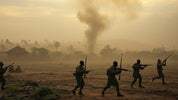
"Unraveling Africa’s Great War: The Second Congo Conflict’s Deadly Chaos and Global Implications"
, by Unboxify, 5 min reading time

, by Unboxify, 5 min reading time
The Second Congo War, often referred to as Africa's Great War, is the deadliest conflict since World War II. Although the exact death toll remains a topic of debate, it is acknowledged as one of the most complex and brutal conflicts in modern history. This article breaks down the key players, motivations, and events to provide a comprehensive understanding of this ongoing conflict.
One of the historical layers contributing to the Second Congo War is the longstanding conflict between the Tutsis and Hutus. The Tutsis are a socio-ethnic group primarily located in the African Great Lakes region, notably in Rwanda and Burundi. In 1994, Hutu extremists carried out a genocidal campaign against the Tutsis, dispersing many Tutsis across the region and creating a significant diaspora.
The First Congo War (1996-1997) set the stage for the Second Congo War. Laurent Kabila, backed by Uganda and Rwanda, overthrew Mobutu Sese Seko, the military dictator of Zaire. The initial support aimed to stop cross-border raids by various guerrilla groups, including remnants of the previous Hutu government. However, the victory was short-lived, lasting only about a year before tensions started to build up again.
Once in power, Kabila struggled to consolidate his authority. Foreign military advisors flooded his government, raising suspicions among Congolese citizens about his legitimacy. Kabila's inability to stop guerrilla fighters and cross-border raids against Uganda and Rwanda further strained relationships with his initial allies.
The turning point came in July 1998 when Kabila dismissed his Rwandan chief of staff and demanded the departure of all Rwandan military units. This led to the defection of the 10th Brigade of the Congolese army, primarily made up of Tutsis. They renamed themselves the Rally for Congolese Democracy (RCD) and received backing from Rwanda and Uganda, who soon invaded Congo.
On August 4, 1998, 200 Ugandan and Rwandan troops flew into the Katona Air Base, capturing it easily due to defection within the garrison force. This staging area allowed for further troops and supplies to arrive, putting nearly 5,000 troops within striking distance of Kinshasa by August 5.
Zimbabwe and Angola were the first and most crucial allies to come to Kabila's aid, providing air support and armored units. Angola's involvement was primarily driven by concerns over their own rebels, the National Union for the Total Independence of Angola (UNITA), who they suspected of receiving support from Rwanda and Uganda.
Other countries, such as Sudan, Chad, and Namibia, also joined the fray. Sudan supported Kabila to antagonize Uganda, while Chad entered the conflict mainly at France's behest. Namibia's involvement was partly due to personal ties between its president and Zimbabwe’s leader.
The Movement for the Liberation of the Congo (MLC) and the Lord’s Resistance Army (LRA) were significant factions in this complex conflict. The MLC, backed by Uganda, offered an alternative to the increasingly Rwanda-influenced RCD. The LRA, a fundamentalist Christian militia, was supported by Sudan and remains active to this day.
With numerous factions fighting each other as well as their own non-state actors, the war turned into a tangled web of alliances and rivalries reminiscent of World War I. Peace efforts were largely ineffective, leading to a protracted military stalemate.
Numerous peace accords were sponsored by international figures such as Muammar Gaddafi and Nelson Mandela. However, the RCD was often excluded from these negotiations due to its internal factions, making it difficult to reach a comprehensive peace settlement.
In January 2001, Laurent Kabila was assassinated by his bodyguard and succeeded by his son, Joseph Kabila. Joseph quickly proved to be a more adept politician and under his leadership, Uganda and Rwanda began their withdrawal, largely finalized by the 2002 Sun City and Pretoria Accords.
The conflict's complexity, along with the Western media's tendency to underreport events in sub-Saharan Africa, contributed to its relative obscurity. The myriad factions and guerrilla tactics employed made it difficult to distill the war into simple narratives.
Despite numerous attempts for peace, pockets of violence continue, especially in regions like Ituri. The Second Congo War remains a testament to the complexities of postcolonial Africa and the long-lasting impacts of hurriedly drawn borders and fractured societies.
The Second Congo War underscores the importance of international attention and intervention. Understanding these conflicts is crucial for global stability and security.
By deep-diving into this often overlooked war, we aim to shed light on the intricacies and human costs of such conflicts, fostering a more informed and compassionate world.